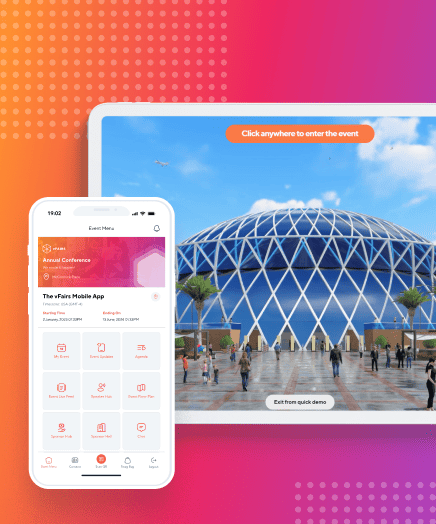2020 has been a year of revelations. As the world reordered itself to find stability in isolation, three interesting discoveries were made:
- you don’t require offices to work
- you don’t need schools to learn
- you don’t need auditoriums to host events
In this way, we realized that a lot of in-person activities can be comfortably conducted at home, while cutting down on operational costs.
Consequently, the popularity of virtual events saw a massive increase in the year. At a time when ensuring attendee safety and cutting costs was extremely critical for businesses, virtual event platforms offered convenience and safety, while being easy on the pocket.
With so many virtual event applications out there, finding the best match isn’t easy. That’s why we’re here to help you choose a virtual event platform that helps your business arrange stellar events. This article will cover seven key factors that you need to consider as you assess your options.
1. Personalization

While virtual event platforms cater to businesses across multiple industries, every business has different needs. This is why every event is unique in terms of design, messaging, and branding.
If you’re arranging a food exhibition, you’d want your event to be full of attractive banners and vibrant colors. Something that gets the appetite rolling, making attendees instantly press the shopping cart button. On the other hand, a Virtual Job Fair might demand more business-friendly colors like grey and blue, to create an air of professionalism.
The more personalized an event, the more realistic it feels. That’s your ultimate goal – to make attendees feel like they’re actually there, and not just staring at a screen.
So, how do you ensure your tool can offer that experience? Check for personalization options when evaluating your solutions. Here are some of the things you can check for:
- How well can you brand the event? Does the platform accommodate your design, content, and technical needs? Can it feature an event that truly seems “yours”?
- Does the solution offer layout options and templates?
- Can you add multiple rooms? Like a lobby, exhibit hall, theater, and auditorium?
- Does the application feature avatars for a more immersive experience? And can they be customized as per your target audience and culture?
2. Reporting

Taking events online has the added benefit of measuring event success. You’re able to get an accurate insight into attendee numbers and can also flag areas for improvement.
Your virtual event platform should be able to provide in-depth reporting and data analytics. Data points like registrations, attendee counts, and engagement duration can help identify bottlenecks and enable you to create even better events in the future.
You can also analyze your event’s ROI and gain insight into how successful your marketing campaigns were. Then, you can update your messaging accordingly. vFairs also offers marketing support options so you can advertise your events in the best way.
3. Device compatibility
Virtual events work so well because they make it easy for attendees to attend them. As the entire event takes place online, those interested can attend from wherever they are. But what if your tool doesn’t work on an Android phone? Or an iPhone? You’re going to miss out on a massive chunk of your audience.
When you choose a virtual event platform, check that it supports mobile users and ensure that it renders seamlessly on all devices. If the application is compatible with all devices, your leads will be able to attend the event from any place, with any device. All they’ll need is a stable internet connection.
4. Customer support

As 2020 has been the first time many businesses conducted a virtual event, timely customer support was imperative to an event’s success. Organizers have been presented with problems they didn’t have to face with physical events, and features that were brand new to them, so they needed extra help. Similarly, as new features are rolled out in 2021, support is as crucial as ever.
Look for solutions that provide 24/7 support, both on-call and via email. Platforms like vFairs provide clients with a dedicated event manager to ensure seamless events. The manager helps set up the event, tailoring it to your needs and setting you up for success. They also step in immediately when you need help both during and after the event.
5. Engagement options
Networking is a critical part of any event. Virtual events often overlook the importance of attendee engagement.
People attend conferences and exhibitions to meet and connect with like-minded people. They also like to engage with exhibitors or ask questions to speakers. If your application isn’t supporting these features, your event just won’t cut it.
Choose a virtual event platform that offers chat features and live webinars with Q&A’s. Attendees should be able to connect with other attendees, which will enable them to network and have a more realistic experience.
6. Cost-efficiency

When it comes to price, there’s a lot of variation in the SaaS world. Two competitors offering very distinct pricing is common. What you want is an optimum feature set without a hefty price tag.
In order to find this, use the software listings like G2’s virtual event software listings to compare pricing along with features. These platforms are great for side-by-side comparisons. If, however, a service provider offers customized pricing, you might have to reach out to them for a quote. You can also use free trials to compare the feature sets and evaluate whether they justify the price.
This might seem like dedicating a lot of time but hard work before committing to a product will enable you to maximize your event’s ROI.
7. Social proof
With the virtual events domain still being fairly new, deciding which one to try out can be overwhelming. If you’ve compared feature sets and pricing plans and are still unable to decide, social proof can offer a quick litmus test.
If several other businesses in your niche have used and loved a particular virtual event platform, it will probably work for you as well.
So before you choose a virtual event platform, shortlist all your options, visit their websites, and read customer testimonials. Next, explore software review websites like Capterra and G2. These platforms consolidate reviews for all popular products, along with their features and pricing. Check for products that are reviewed often and rated highly. vFairs for example has a 4.7 star rating from 222 reviews on Capterra. Check out all the Capterra listings for virtual event software.
Conclusion
The virtual events industry has only just taken flight. There are a lot of new contenders and a difficult decision-making process ahead of you. But take your time and carefully compare your options. Make this blog your checklist as you choose a virtual event platform and you’ll be able to find the solution that best fits your business needs. With the right application, you’ll be able to design unforgettable events for your target audience.


